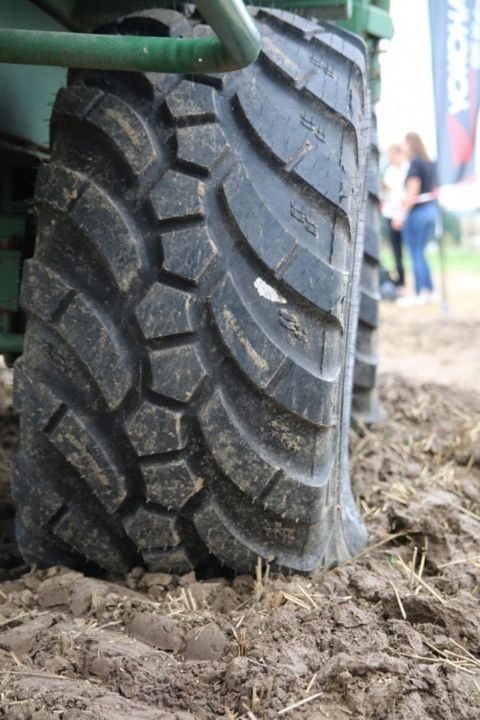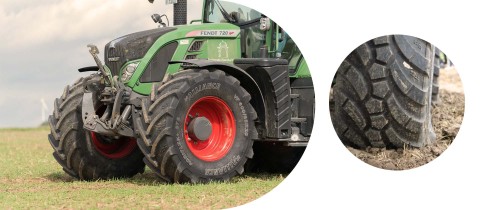Avoiding soil compaction with Alliance 372 VF and 389 VF technology
SOURCE: De Loonwerker, 2022
It actually makes sense. Take a tractor equipped with modern VF tyres with very high deflection, such as the Alliance Agriflex 372 VF, and an air pressure control system: when that tractor is used in the field with a tyre pressure of only 0.8 bar, it is very soft on the soil and prevents compaction. However, it is equally logical that the same cannot be said of a tractor with VF tyres pulling a trailer with tyres with standard technology and a higher tyre pressure. The positive effects of tractor-mounted VF tyres are negated with a single pass of the trailer - especially when the soil is wet and thus prone to compaction.
Heuver is an official Alliance importer
For years we are official importer of Alliance in the Benelux, one of the most trusted brands within the agricultural sector. Alliance's product range is extensive and in our delivery program we have many sizes and profiles for the most diverse types of machines directly available to you.
Holistic approach needed
Effectively protecting the soil from compaction can only be achieved if both tractor and trailer are equipped with modern tyres. This is why flotation and VF technology - together with air pressure control systems - are receiving increasing attention. This context was clearly visible during a demonstration event of ILVO/Inagro and the University of Ghent where Yokohama Off-Highway Tyres (YOHT) gave a demonstration of soil protection using flotation tyres and VF technology.
In theory, the effects are clear. This was illustrated during the event by graphs showing the size of the tread in cm2 and the resulting pressure on the soil in a comparison of VF tyres (tyre pressure 1.0 bar) versus radial tyres with a tyre pressure of 2.0 bar ("H") and radial tyres with a lower tire pressure ("L," 1.4 bar). The larger the tyre tread and the lower the tyre pressure, the lower the pressure applied to the soil (Fig. 1).
Contact area in cm2

Fig. 1: Contact area and tyre pressure of VF and radial tyres and the resulting ground pressure (Source: https://www.bodemverdichting.be/nl)
Soil pressure in kg/cm2

Fig. 2: Soil pressure at two depths as a result of tire type and tire pressure (Source: https://www.bodemverdichting.be/nl)
Ground pressure as a result of a passage with different tyres and/or tyre pressures is shown in Figure 2. The pressure is more emphatic in the upper soil layer (20 cm) than in the subgrade (40 cm), while the positive effects of VF tyres and reduced tyre pressure are clearly visible in both layers. These results show that - with the wheel loads tested - lower tyre pressure and a larger tyre tread result in lower soil pressure and less soil compaction. However, it should be noted that higher soil moisture reduces soil stability, increasing the risk of soil compaction.
These interrelationships are very important for soil fertility and soil functions: unless energy-intensive deep tillage and subsoil tilling are applied, subsoil compaction can cause lasting problems related to reduced root growth and limited air and water exchange.
Revenue implications
Protecting soil from compaction is an important part of good agricultural practices for good reason: trials within the Inagro project, for example, have clearly shown that soil compaction has significant effects on yield parameters (Fig. 3).


Fig. 3: Tread and soil pressure, penetration resistance in soil profile and resulting sugar yield in the variants Control, Self-propelled spreader with dog walk (AS 1), Self-propelled spreader without dog walk (AS 2), Tractor and trailer with high tire pressure ("H", 4.5 bar) and low tire pressure:("L", 1.4 bar) (Source: https://www.bodemverdichting.be/nl).
While there were only slight yield differences between the best variants, namely the self-propelled spreader with dog walk and the tractor-trailer combination with reduced tire pressure, sugar yield was already somewhat lower in the variant with the self-propelled spreader without dog walk, and significantly lower after the tractor-trailer combination at a tire pressure of 4.5 bar. These results again show that lower tire pressure and larger tread lead to lower soil compaction - and thus to lower yield losses. However, it can also be noted that the reduced number of passes - i.e., only one pass with the self-propelled spreader with dog walk - seems to have affected soil and yields somewhat less - but without statistical relevance.

Putting soil protection into practice
Maintaining agricultural lands as a finite resource for the production of food, feed and fiber for a growing world population is of paramount importance. However, this must be achieved without compromising farmer efficiency and productivity.
That is why engineers at YOHT's Alliance brand have worked continuously on radial tractor tyres, on tractor tyres with improved deflection (IF) and very high deflection (VF), on radial flotation tyres for trailers and - as a real world first - on the combination of flotation and VF technology in the Alliance 389 VF tire for trailers. This tire increases ground protection and efficient operations to unprecedented levels.
Evidence of how the Alliance 389 VF-Imp works in the field was presented in September 2021 during field demonstrations at the ILVO/Inagro event at the Bayer ForwardFarm Hof ten Bosch in Huldenberg, Belgium. Mounted on a trailer and combined with an air pressure monitoring system, the Alliance 389 VF-Imp made soil protection visible and measurable.
Besides the significantly lower tire pressure and flotation properties, the larger tire tread also gives positive effects. The weight of the trailer and the load are supported on a contact surface that is about 25 percent larger than with standard tyres. In addition, this tire is characterized by a very strong carcass that can go with 30 percent lower tire pressure - even down to as little as 0.8 bar in the field - steel belts for reduced rolling resistance and minimal failure, and special compounds for better performance overall and reduced wear.
"As could be seen during the field demonstrations at Hof ten Bosch, flotation and VF technology offer a convincing total package - and all the more so with an air pressure control system, which allows changes to lower tire pressure in the field and higher for road transport. Of course, if no air pressure control system is available, these VF tyres will run at 30% lower inflation pressures with even higher loads compared to tyres with standard technology and this in the field and for road transport. These tyres are designed to prevent soil compaction and enable efficient work - and they really do. Measurements in the field with a thumb stick and a penetrometer clearly showed the positive effects of our combination of flotation and VF technology," concludes Gerrit Vinkers, Customer Quality Improvement and Application Specialist at YOHT.

